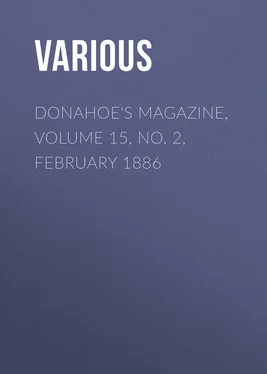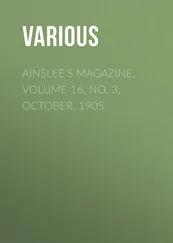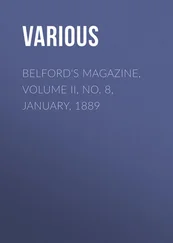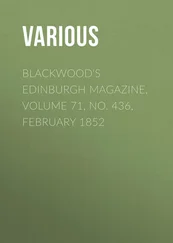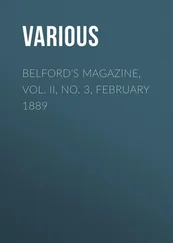Various - Donahoe's Magazine, Volume 15, No. 2, February 1886
Здесь есть возможность читать онлайн «Various - Donahoe's Magazine, Volume 15, No. 2, February 1886» — ознакомительный отрывок электронной книги совершенно бесплатно, а после прочтения отрывка купить полную версию. В некоторых случаях можно слушать аудио, скачать через торрент в формате fb2 и присутствует краткое содержание. Издательство: Иностранный паблик, Жанр: foreign_edu, periodic, на английском языке. Описание произведения, (предисловие) а так же отзывы посетителей доступны на портале библиотеки ЛибКат.
- Название:Donahoe's Magazine, Volume 15, No. 2, February 1886
- Автор:
- Издательство:Иностранный паблик
- Жанр:
- Год:неизвестен
- ISBN:нет данных
- Рейтинг книги:4 / 5. Голосов: 1
-
Избранное:Добавить в избранное
- Отзывы:
-
Ваша оценка:
- 80
- 1
- 2
- 3
- 4
- 5
Donahoe's Magazine, Volume 15, No. 2, February 1886: краткое содержание, описание и аннотация
Предлагаем к чтению аннотацию, описание, краткое содержание или предисловие (зависит от того, что написал сам автор книги «Donahoe's Magazine, Volume 15, No. 2, February 1886»). Если вы не нашли необходимую информацию о книге — напишите в комментариях, мы постараемся отыскать её.
Donahoe's Magazine, Volume 15, No. 2, February 1886 — читать онлайн ознакомительный отрывок
Ниже представлен текст книги, разбитый по страницам. Система сохранения места последней прочитанной страницы, позволяет с удобством читать онлайн бесплатно книгу «Donahoe's Magazine, Volume 15, No. 2, February 1886», без необходимости каждый раз заново искать на чём Вы остановились. Поставьте закладку, и сможете в любой момент перейти на страницу, на которой закончили чтение.
Интервал:
Закладка:
He received them in his own house, which they mistook for their convent. Great was their surprise when they heard that the handsome pillared edifice in the next square was theirs. "I will conduct you thither," said he; "but first we will visit our Lord in the church." The Rev. Mother, M. Frances Warde, and the Sisters, admired the exquisite church, and the extreme neatness and beauty of the altar. "No hand," said he, "but mine has ever touched that altar. No secular has ever been admitted within the sanctuary rails even to sweep. I myself sweep the sanctuary, and attend to the cleanliness of everything that approaches the Blessed Sacrament. But my work as sole priest here is now so arduous, that I will resign this sweet and sacred duty to you."
Schools were immediately opened for boys, girls, adults. Night schools and an academy for the higher studies followed. On account of the superior instruction given in this institution, it has always been well patronized by the best Protestant families in New Hampshire. Indeed, the success of the Sisters of Mercy in this stronghold of Puritanism has been phenomenal. During Father MacDonald's incumbency, Catholics increased from a few despised aliens to more than half the population of Manchester. He was never obliged to ask them for money; they gave him all he needed. He never failed to meet his engagements; and in one way or another every coin he handled went to God's church or God's poor. He laid up nothing for himself. He had the most exalted ideas of the priesthood, and he carried them out to the letter in his daily life. Thousands of young men have been enrolled in his sodalities. As an example to them, he totally abstained from tobacco and from intoxicating drink. St. John's Total Abstinence Society was the pride of his heart. One of his "Sodality Boys," Right Rev. Denis Bradley, became first bishop of Manchester, and many have become zealous priests. From the girls' schools and the sodalities, too, many religious vocations have sprung, and the number of converts under instruction is always very large. This worthy priest brought free Catholic education within the reach of every Catholic in his adopted city. As soon as he finished one good work he began another, and splendid churches, convents, schools, orphanage, hospital, home for old ladies, etc., remain as monuments of his zeal. These institutions are not excelled in the country. They are all administered by the Sisters of Mercy, to whom he was a most generous benefactor.
During the forty-one years of Father MacDonald's life in Manchester, he never took a vacation but one, which his bishop compelled him to take. He was so methodical in the distribution of his time that it was said he did the work of six priests, and did it well. He knew every member of his flock, and was to all friend and father as well as priest, their refuge in every emergency. Every day he studied some point of theology, visited his schools and other institutions, and went the rounds of his sick and poor. Every home had its allotted duty, and grave, indeed, should be the reasons that could induce him to deviate one iota from his ordinary routine. His charities were unbounded, yet given with discrimination, nor did his left hand know what his right hand gave. With the sick and the aged, he was like a woman, or a mother. He would make their fires, warm drinks for them, see that they had sufficient covering. Though they all doated on "Father Mac," they must not thank him, or even pretend they saw what he was doing for them, so well did they know that he worked solely for Him who seeth in secret . Monday, August 24, 1885, this holy man was stricken with paralysis of the brain, and died two days later, while the bishop and the Sisters of Mercy were praying for his soul. It is almost certain that he had some presentiment of his death, as he selected the Gregorian Requiem Mass for his obsequies, and asked the choir to practise it. August 28, his sacred remains were committed to the earth, the funeral sermon being preached by the bishop, who had been as a son to the venerable patriarch. In real, personal holiness, Father MacDonald possessed the only power that makes the knee bend. Over twenty years ago, his sexton said to the writer: "I never opened the church in the morning that I did not find Father MacDonald kneeling before the Blessed Sacrament." What time he entered it, no one knew. How edifying this must have been to the poor factory hands, who were wont to beg God's blessing on their daily labor, in the short, scorching summer, and the bitter cold of the long winter, for at that time the church was not heated. Never did these children of toil miss that bent and venerable form, absorbed in prayer before the hidden Jesus, of whose august presence he had such a vivid realization.
Before such a life of toil and prayer, no bigotry could stand. By sheer force of virtue alone, this holy man wrought a complete change in the sentiments of his adversaries. Hence the extraordinary respect shown to his memory. The non-Catholic press says that no man ever exercised so much influence in Manchester for forty years as Father MacDonald, and that he was the man whom Manchester could least afford to lose. The mayor and the city government attended his obsequies in a body, and the governor of New Hampshire wrote to express his regret that absence hindered his paying the last tribute of respect to a priest he so highly revered. Business was suspended and all the factories closed, that the whole city might follow his remains to the tomb. On Sunday, August 30, the non-Catholic pulpits of the thrifty city resounded with the praises of this humble priest, whose chief characteristics were stainless integrity, an entire absence of human respect, burning zeal for God's glory, and life-long efforts to promote it. He feared no man and sought the favor of none, and his noble independence of character won him the admiration of all who had the privilege of knowing him. His death was universally deplored as the greatest calamity that ever befell Manchester. Among the Protestant ministers who eulogized him in their sermons, August 30, was Rev. Dr. Spalding, who thanked God for raising up a man whose life was remarkable "for its large consecration to Church and people, for its high earnestness, its sacrifices and unselfishness, its purity and truthfulness. God grant unto us all," he continued, "a desire to imitate this life in its devotion to others, and its trust in Him."
Конец ознакомительного фрагмента.
Текст предоставлен ООО «ЛитРес».
Прочитайте эту книгу целиком, на ЛитРес.
Безопасно оплатить книгу можно банковской картой Visa, MasterCard, Maestro, со счета мобильного телефона, с платежного терминала, в салоне МТС или Связной, через PayPal, WebMoney, Яндекс.Деньги, QIWI Кошелек, бонусными картами или другим удобным Вам способом.
1
Sampson.
2
Cardinal Moran "Irish Saints in G. Brit." p 121.
3
Theiner. Mon. Vat. p. 48.
4
Cox. Hist. pt. I. p. 322.
5
O'Sulliv. Cath. Hist. p. 96.
6
The Irish Catholic names, Sullivan and Carroll, are stamped on two of the ten counties of New Hamshire, in memory of Revolutionary heroes.
Интервал:
Закладка:
Похожие книги на «Donahoe's Magazine, Volume 15, No. 2, February 1886»
Представляем Вашему вниманию похожие книги на «Donahoe's Magazine, Volume 15, No. 2, February 1886» списком для выбора. Мы отобрали схожую по названию и смыслу литературу в надежде предоставить читателям больше вариантов отыскать новые, интересные, ещё непрочитанные произведения.
Обсуждение, отзывы о книге «Donahoe's Magazine, Volume 15, No. 2, February 1886» и просто собственные мнения читателей. Оставьте ваши комментарии, напишите, что Вы думаете о произведении, его смысле или главных героях. Укажите что конкретно понравилось, а что нет, и почему Вы так считаете.
